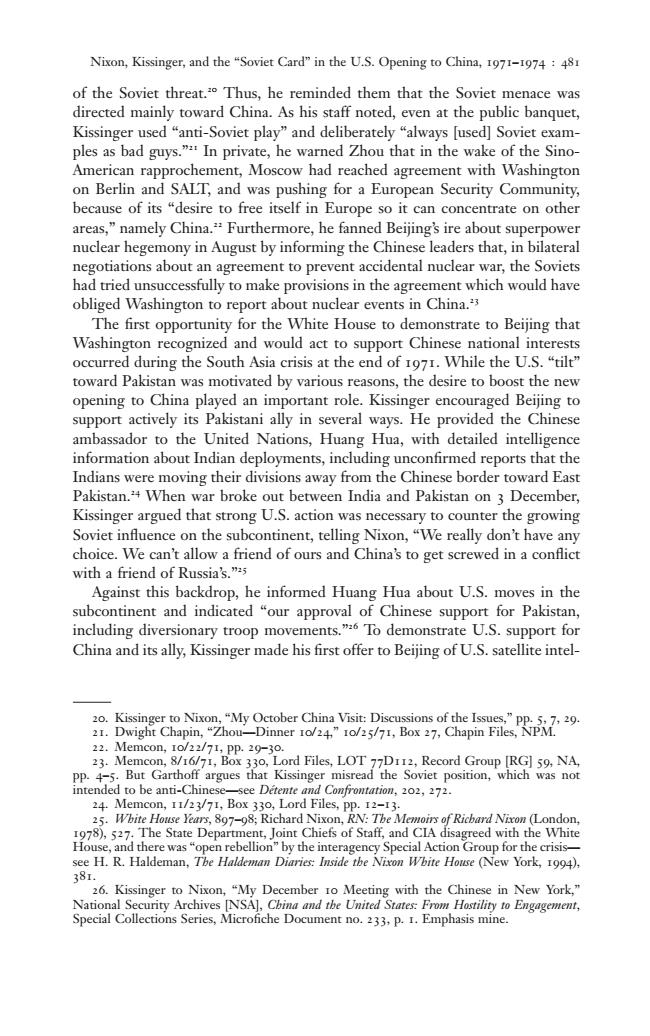正在加载图片...

Nixon,Kissinger,and the "Soviet Card"in the U.S.Opening to China,1971-1974:481 of the Soviet threat.Thus,he reminded them that the Soviet menace was directed mainly toward China.As his staff noted,even at the public banquet, Kissinger used "anti-Soviet play"and deliberately "always [used]Soviet exam- ples as bad guys."In private,he warned Zhou that in the wake of the Sino- American rapprochement,Moscow had reached agreement with Washington on Berlin and SALT,and was pushing for a European Security Community, because of its "desire to free itself in Europe so it can concentrate on other areas,"namely China.Furthermore,he fanned Beijing's ire about superpower nuclear hegemony in August by informing the Chinese leaders that,in bilateral negotiations about an agreement to prevent accidental nuclear war,the Soviets had tried unsuccessfully to make provisions in the agreement which would have obliged Washington to report about nuclear events in China.*3 The first opportunity for the White House to demonstrate to Beijing that Washington recognized and would act to support Chinese national interests occurred during the South Asia crisis at the end of 1971.While the U.S."tilt" toward Pakistan was motivated by various reasons,the desire to boost the new opening to China played an important role.Kissinger encouraged Beijing to support actively its Pakistani ally in several ways.He provided the Chinese ambassador to the United Nations,Huang Hua,with detailed intelligence information about Indian deployments,including unconfirmed reports that the Indians were moving their divisions away from the Chinese border toward East Pakistan.'When war broke out between India and Pakistan on 3 December, Kissinger argued that strong U.S.action was necessary to counter the growing Soviet influence on the subcontinent,telling Nixon,"We really don't have any choice.We can't allow a friend of ours and China's to get screwed in a conflict with a friend of Russia's."5 Against this backdrop,he informed Huang Hua about U.S.moves in the subcontinent and indicated "our approval of Chinese support for Pakistan, including diversionary troop movements."6 To demonstrate U.S.support for China and its ally,Kissinger made his first offer to Beijing of U.S.satellite intel- 20.Kissinger to Nixon,"My October China Visit:Discussions of the Issues,"pp.5,7,29. 21.Dwight Chapin,"Zhou-Dinner 1o/24,"10/25/71,Box 27,Chapin Files,NPM. 22.Memcon,Io/22/71,pp.29-30. 23.Memcon,8/16/71,Box 330,Lord Files,LOT 77DI12,Record Group [RG]59,NA, pp.4-5.But Garthoff argues that Kissinger misread the Soviet position,which was not intended to be anti-Chinese-see Detente and Confrontation,202,272. 24.Memcon,11/23/71,Box 330,Lord Files,pp.I2-13. 25.White House Years,897-98;Richard Nixon,RN:The Memoirs of Richard Nicon (London, 1978),527.The State Department,Joint Chiefs of Staff,and CIA disagreed with the White House,and there was"open rebellion"by the interagency Special Action Group for the crisis- see H.R.Haldeman,Tbe Haldeman Diaries:Inside the Nixon Wbite House (New York,1994), 381. 26.Kissinger to Nixon,"My December to Meeting with the Chinese in New York," National Security Archives NSA],China and the United States:From Hostility to Engagement, Special Collections Series,Microfiche Document no.233,p.I.Emphasis mine.of the Soviet threat.20 Thus, he reminded them that the Soviet menace was directed mainly toward China. As his staff noted, even at the public banquet, Kissinger used “anti-Soviet play” and deliberately “always [used] Soviet examples as bad guys.”21 In private, he warned Zhou that in the wake of the SinoAmerican rapprochement, Moscow had reached agreement with Washington on Berlin and SALT, and was pushing for a European Security Community, because of its “desire to free itself in Europe so it can concentrate on other areas,” namely China.22 Furthermore, he fanned Beijing’s ire about superpower nuclear hegemony in August by informing the Chinese leaders that, in bilateral negotiations about an agreement to prevent accidental nuclear war, the Soviets had tried unsuccessfully to make provisions in the agreement which would have obliged Washington to report about nuclear events in China.23 The first opportunity for the White House to demonstrate to Beijing that Washington recognized and would act to support Chinese national interests occurred during the South Asia crisis at the end of 1971. While the U.S. “tilt” toward Pakistan was motivated by various reasons, the desire to boost the new opening to China played an important role. Kissinger encouraged Beijing to support actively its Pakistani ally in several ways. He provided the Chinese ambassador to the United Nations, Huang Hua, with detailed intelligence information about Indian deployments, including unconfirmed reports that the Indians were moving their divisions away from the Chinese border toward East Pakistan.24 When war broke out between India and Pakistan on 3 December, Kissinger argued that strong U.S. action was necessary to counter the growing Soviet influence on the subcontinent, telling Nixon, “We really don’t have any choice. We can’t allow a friend of ours and China’s to get screwed in a conflict with a friend of Russia’s.”25 Against this backdrop, he informed Huang Hua about U.S. moves in the subcontinent and indicated “our approval of Chinese support for Pakistan, including diversionary troop movements.”26 To demonstrate U.S. support for China and its ally, Kissinger made his first offer to Beijing of U.S. satellite intelNixon, Kissinger, and the “Soviet Card” in the U.S. Opening to China, 1971–1974 : 481 20. Kissinger to Nixon, “My October China Visit: Discussions of the Issues,” pp. 5, 7, 29. 21. Dwight Chapin, “Zhou—Dinner 10/24,” 10/25/71, Box 27, Chapin Files, NPM. 22. Memcon, 10/22/71, pp. 29–30. 23. Memcon, 8/16/71, Box 330, Lord Files, LOT 77D112, Record Group [RG] 59, NA, pp. 4–5. But Garthoff argues that Kissinger misread the Soviet position, which was not intended to be anti-Chinese—see Détente and Confrontation, 202, 272. 24. Memcon, 11/23/71, Box 330, Lord Files, pp. 12–13. 25. White House Years, 897–98; Richard Nixon, RN: The Memoirs of Richard Nixon (London, 1978), 527. The State Department, Joint Chiefs of Staff, and CIA disagreed with the White House, and there was “open rebellion” by the interagency Special Action Group for the crisis— see H. R. Haldeman, The Haldeman Diaries: Inside the Nixon White House (New York, 1994), 381. 26. Kissinger to Nixon, “My December 10 Meeting with the Chinese in New York,” National Security Archives [NSA], China and the United States: From Hostility to Engagement, Special Collections Series, Microfiche Document no. 233, p. 1. Emphasis mine